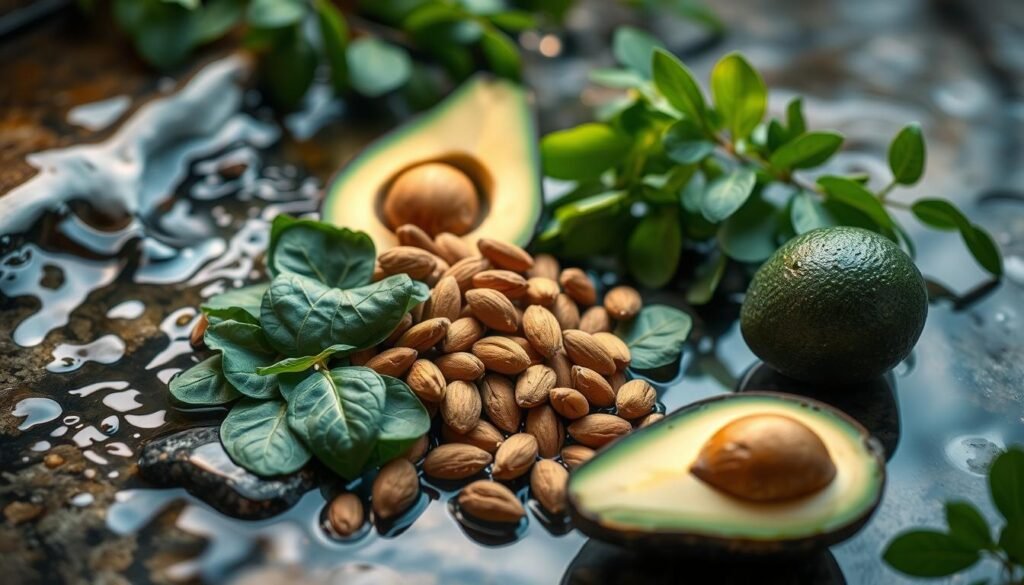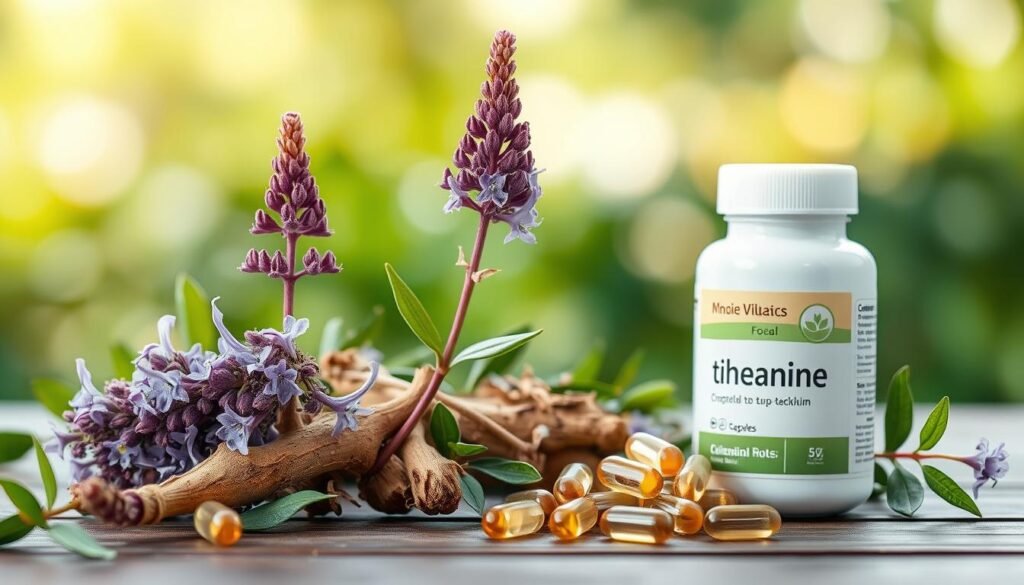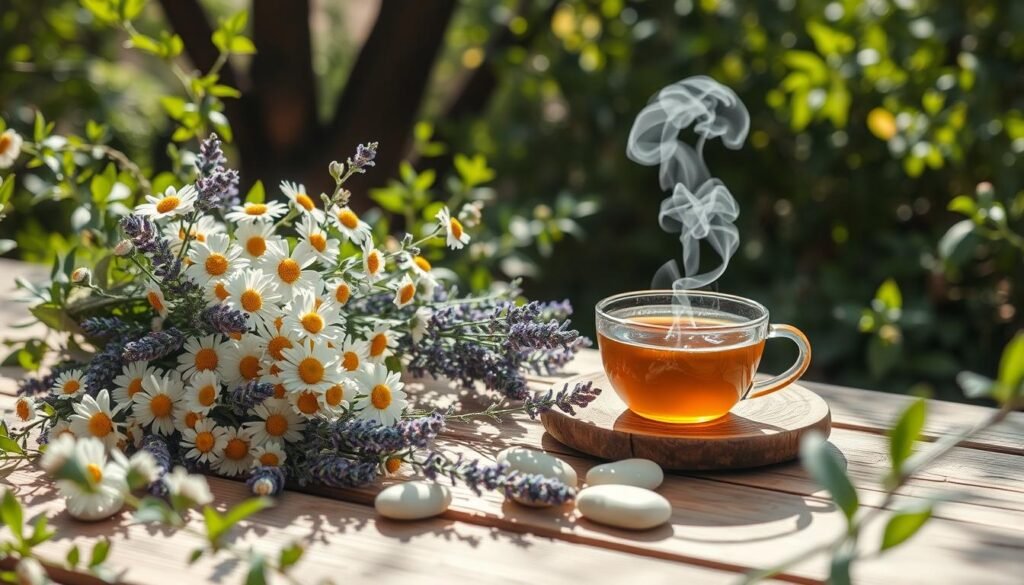About 6.8 million adults in the U.S. suffer from Generalized Anxiety Disorder. But only 43.2% get help. This shows a big gap in anxiety treatment, pushing many toward non-prescription options. Over-the-counter (OTC) remedies are popular among those seeking a less invasive first step.
OTC options, including herbal treatments, can lessen anxiety symptoms. Lavender, for instance, might reduce mild anxiety. Ashwagandha could lower stress by reducing cortisol levels. Also, chamomile and valerian may help manage anxiety, making these OTC choices worth considering.
Anxiety’s rise calls for exploring OTC solutions and lifestyle changes for better health. Knowing about these alternatives can empower you. It lets you make smart choices in finding anxiety relief that fits your situation.
Key Takeaways
- Over-the-counter remedies can provide significant relief for anxiety symptoms.
- Common OTC options include lavender, ashwagandha, and chamomile.
- Regular exercise is an effective counter to anxiety and stress.
- Only a small percentage of those with Generalized Anxiety Disorder receive treatment.
- OTC medications are popular for their accessibility and lower risk of dependence.
Understanding Anxiety Disorders
Anxiety disorders are a group of mental health issues. They involve too much fear or worry that messes with daily life. Learning about the different kinds of anxiety is key to getting the right help. Generalized Anxiety Disorder (GAD) is seen in one out of three people. It’s becoming more common in young folks, which is worrying for public health.
Around 19% of people in the U.S. are dealing with anxiety disorders. These can pop up as panic disorder or specific phobias. Symptoms often include non-stop worry, feeling your heart race, and changes in how you act. These can all affect both your work and personal life.
To handle anxiety, it’s crucial to find out what’s causing it. Not getting enough sleep can make anxiety 30% worse. Treatments like Mindfulness-Based Cognitive Therapy (MBCT) and Cognitive Behavioral Therapy (CBT) have shown to help. Studies show that CBT can keep helping even after sessions end.
Knowing about these disorders helps in finding ways to deal with them. Doing things like exercising and breathing deeply can really help control anxiety. Being aware of treatment choices, from meds like SSRIs to changing your lifestyle, gives people the power to manage their mental health better.
Why Over The Counter Medicine for Anxiety is Considered
Many people turn to OTC anti-anxiety drugs before thinking about prescription meds. They find over the counter remedies easy to get and use. Products like herbal supplements and vitamins are a gentle way to start.
A lot of adults in the U.S. face anxiety, but often wait to seek help. About 19% are affected. They see OTC solutions as a good first step. They’re wary of the side effects that prescriptions might have.
Over the counter remedies aren’t checked by the FDA for safety. So, their effectiveness can be hit or miss. Some find relief in herbs like valerian root. Yet, differences in quality and ingredients can be dangerous.
Talking to a doctor before starting OTC treatments is key. It helps make sure they won’t mix badly with other meds. Making well-informed choices about non-prescription options is crucial.
Common Types of Over The Counter Remedies
Many people look for anxiety relief through common OTC remedies. These include herbal supplements, vitamins, and changing daily habits. They don’t require a doctor’s note. More and more people want these easy-to-get options instead of standard treatments.
Some top best OTC anxiety supplements are popular because they work well:
- Omega-3 fatty acids: Found in fish oil. They help lessen inflammation and anxiety, especially for young adults.
- Ashwagandha: An herb that reduces cortisol, making you feel less stressed and anxious.
- L-Theanine: From green tea. This amino acid helps calm you down and ease stress.
- Lavender: Known for its soothing effects. It can help ease light anxiety and even improve sleep.
- Chamomile: This calming herb can help you relax. But, it’s not super strong against anxiety.
- Valerian root: Mostly used for better sleep. More studies are needed to see its effect on anxiety.
Many have found these natural remedies for anxiety helpful, but results can vary. Some may see big improvements, while others might not notice much. It’s important to remember that everyone’s experience can be different.
Eating well, staying active, and practicing mindfulness can support these remedies. Together, they offer a full plan for easing anxiety symptoms. This way, you can build a caring space for your mental health.
| Remedy | Potential Benefits | Comments |
|---|---|---|
| Omega-3 Fatty Acids | Reduces inflammation and anxiety | Effective among young adults |
| Ashwagandha | Lowers cortisol, reduces stress | Has adaptogenic properties |
| L-Theanine | Promotes relaxation | Found in green tea |
| Lavender | Alleviates anxiety and insomnia | Commonly used calming agent |
| Chamomile | Promotes relaxation | Modest effects on anxiety |
| Valerian Root | Improves sleep quality | More research needed on anxiety |
Magnesium: A Natural Supplement for Anxiety Relief
Magnesium is a vital mineral for our health. It has a key role in the functions of our brain’s neurotransmitters. This makes it great for those dealing with anxiety. As a mood regulator, magnesium helps ease anxiety symptoms. It is becoming known as a top over-the-counter option for anxiety relief.
Benefits of Magnesium
Magnesium does more than just help with anxiety. It fights against symptoms seen in low magnesium levels, like:
- Anxiety
- Stress
- Depression
- Insomnia or sleep disturbances
- Headaches or muscle pain/tightness
- Fatigue
Studies show taking magnesium can lower these symptoms. This underlines its value for our health.
Recommended Dosage and Sources
Adults should get 310 to 420 mg of magnesium daily, says the FDA. For anxiety, 75 to 360 mg might help. But, don’t go over 350 mg a day from supplements to avoid bad effects. Going over 2500 mg can lead to serious problems.
Magnesium can be found in foods like:
- Leafy greens
- Avocado
- Dark chocolate
- Legumes
- Whole grains
- Nuts and seeds

Picking the right kind of magnesium is key. Good absorption types like magnesium glycinate and magnesium l-threonate could help lessen anxiety. With many Americans not getting enough magnesium, adding it to your diet or taking a supplement is important for better mental health.
| Type of Magnesium | Benefits | Recommended Use |
|---|---|---|
| Magnesium Glycinate | Good absorption, potential stress reduction | Anxiety relief |
| Magnesium L-Threonate | Improves cognitive function and mental clarity | General health |
| Magnesium Citrate | Commonly found in OTC supplements | General supplementation |
| Magnesium Malate | May help with fatigue and muscle pain | Energy support |
Exploring Herbal Remedies: Ashwagandha and Kava
Many people are now turning to herbal remedies for anxiety over traditional meds. Ashwagandha and kava are top choices due to their unique benefits. Before using them, understanding how they work and their risks is key.
How Ashwagandha Works
Ashwagandha, also known as Withania somnifera, is a powerful adaptogen that aids in stress relief. It mainly reduces cortisol levels, helping ease anxiety. Research, including a 2019 study with 58 people, showed that taking 600 mg of ashwagandha daily can lower stress significantly.
Another study found that 240 mg can also help with anxiety symptoms over 60 days. This makes ashwagandha a great choice for those looking for herbal anxiety solutions.
Potential Risks of Kava
Kava is another popular herb for easing anxiety. However, its use is linked to serious liver health risks. The U.S. FDA has issued warnings after reports of liver damage from short-term kava use.
So, before picking kava for anxiety relief, talking to a healthcare expert is vital. They can advise on safety and suggest other safe options.
| Herb | Potential Benefits | Risks | Recommendation |
|---|---|---|---|
| Ashwagandha | Reduces cortisol levels, helps alleviate anxiety | Generally safe, may cause digestive upset | Consult a healthcare provider, especially if on other medications |
| Kava | Reduces anxiety and stress | Serious liver damage reported; FDA warnings | Avoid without professional guidance |
Other Effective OTC Options: Valerian Root and L-Theanine
People are turning to natural supplements for help with anxiety. Valerian root and L-theanine are popular for their unique benefits. Valerian root helps with sleep, and L-theanine calms you down without making you sleepy. Knowing how they work can help you choose the best one for anxiety relief.
Valerian Root for Sleep and Anxiety
Valerian root is known for its calming effects. It’s especially good for those who can’t sleep because of anxiety. Studies show valerian can help you relax and sleep better. A 2017 study found it can also reduce anxiety and depression in postmenopausal women.
It comes in teas, capsules, or tinctures. But, it’s important to talk to a doctor about how much to take to avoid side effects.
L-Theanine’s Calming Effects
L-theanine is an amino acid found mainly in green tea. It’s praised for helping you stay calm. Taking 200 mg can lower stress and cortisol, a stress hormone. It’s a natural option for those seeking anxiety relief without feeling tired.
Adding L-theanine to your daily routine can support other ways you manage anxiety. To learn more about anxiety supplements, check out this great resource here.

| Supplement | Primary Use | Benefits | Considerations |
|---|---|---|---|
| Valerian Root | Sleep aid, anxiety relief | Improves sleep quality, reduces anxiety | High doses may worsen symptoms |
| L-Theanine | Calming agent | Reduces stress and cortisol levels | Non-sedating, may interact with medications |
Utilizing CBD Oil for Anxiety Management
CBD oil for anxiety is getting a lot of attention. It’s seen as a hopeful choice for those seeking relief from anxiety issues. About 31.1% of U.S. adults experience anxiety during their lives. This makes it a common condition. People often turn to CBD oil since it doesn’t have mind-altering effects and may help.
Studies have found that 78.1% to 79.2% of people using CBD for anxiety or sleep felt better after two months. This shows CBD could really help ease anxiety symptoms for many. Plus, a study from New Zealand found CBD users noticed life quality improvements in just three weeks, especially for anxiety or depression.
But choosing the right CBD oil is key. A lot of products out there don’t have enough CBD to match what studies show works. In one study, only about 70% were happy with their CBD use. A few even had side effects like feeling drowsy or having intense dreams.
Dosing CBD can vary widely, from 6 to 400 mg per dose. This highlights the need for more research to find the best dosage. If you’re considering CBD oil for anxiety, talk to your doctor first. They can help you start with the right amount and check for any drug interactions.
Non-Prescription Anxiety Treatment: Natural Remedies
Many people look for non-medical ways to ease anxiety. They often choose natural remedies. Aromatherapy and mindfulness have become popular because of their success in easing anxiety.
Aromatherapy and Essential Oils
Aromatherapy uses oils like lavender, which is calming. Lavender has been found to lessen anxiety. It’s favored for relaxation. Breathing in the scents of essential oils can make a space calm. This helps provide quick relief when stressed.
Physical Activity and Mindfulness Techniques
Regular exercise helps reduce anxiety by releasing endorphins. These are chemicals in our body that make us feel good. Pairing exercise with meditation has shown good outcomes. Studies say meditation can lower anxiety. It improves mental health overall.

Adding natural remedies for anxiety to everyday life can make a big difference in mental health. Also, learning about moderate anxiety signs helps. It shows when it’s time to seek expert advice.
When to Consider Professional Help
Knowing when over-the-counter remedies aren’t enough is key to managing anxiety. There comes a time when professional treatment is needed if simple solutions fail. Look for signs like ongoing anxiety that affects your daily activities, chronic physical symptoms, and thoughts of harming yourself.
About 1 in 5 adults globally are impacted by anxiety disorders. Women are more often diagnosed. Although natural supplements may help some, their success varies greatly. It’s very important to talk with a healthcare provider to create a treatment plan. This plan could include medications, therapy, and changes in your lifestyle.
Dealing with anxiety usually involves both medication and therapy. Cognitive behavioral therapy (CBT) is a powerful method. As noted by the Mayo Clinic, working with mental health experts can significantly improve your condition.
Learning coping techniques and how to manage stress is also beneficial. Getting educated about your disorder and finding support groups help strengthen emotional health. Knowing when to get help and using the resources available can lead to a better mental state.
Conclusion
OTC anti-anxiety drugs can help with mild to moderate anxiety. But they’re not the only solution. There are many treatments for anxiety. These range from natural remedies to prescribed meds for more severe cases. It’s key to know the benefits and limits of these options.
OTC remedies are for those with less severe anxiety. People might choose them over traditional treatments. It’s important to consider how effective and safe these options are. A healthcare pro can help plan a safe and effective treatment. Personal preferences should guide this plan.
Knowing about natural and professional treatments helps in managing anxiety well. Learning about anxiety treatments is a big step towards better mental health. For more on recommended treatments, check this link.